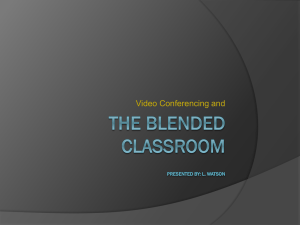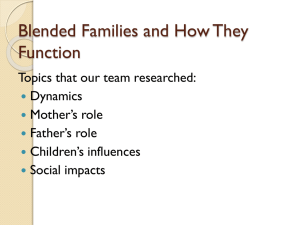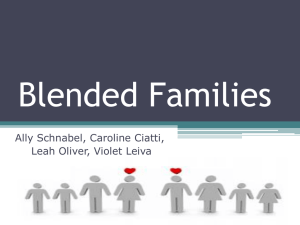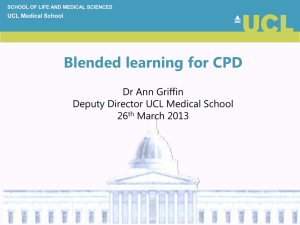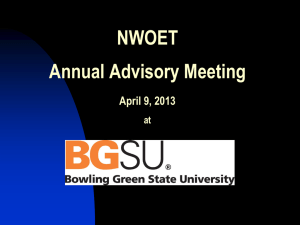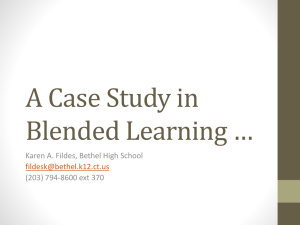Blended Learning - Dr.Antar Abdellah Home Page
advertisement
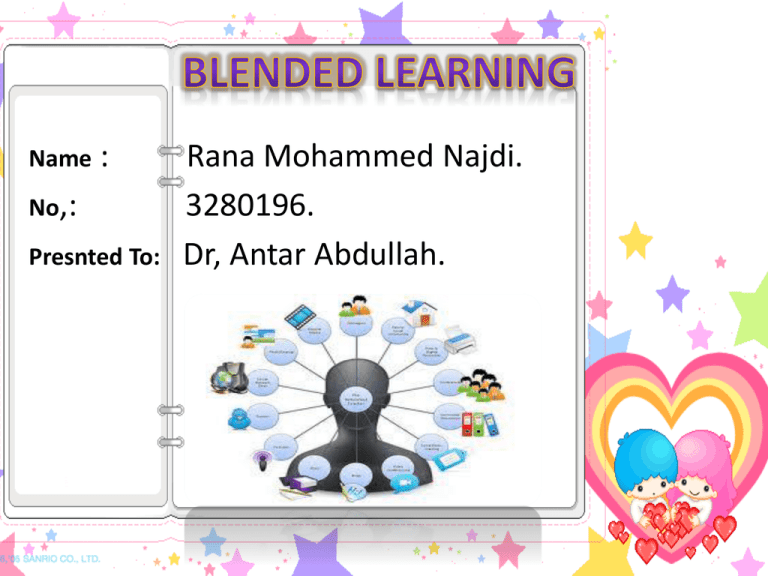
Name : No,: Presnted To: Rana Mohammed Najdi. 3280196. Dr, Antar Abdullah. . What is blended learning ? Blended learning is education that combines face-to-face classroom methods with computer-mediated activities.[1] According to its proponents, the strategy creates a more integrated approach for both instructors and learners. How? For example, consider a traditional class meeting schedule. Say that the course would normally meet MWF, from 1-3 PM. If the institution were to apply a blended learning approach, the course may change so that it meets once per week instead of the usual three-session format. Learning activities that otherwise would have taken place during classroom time can be moved online. Compnents Of Blended Learning . "You may hear blended learning described as “integrated learning”, “hybrid learning”, “multi-method learning” (Node, 2001). "The term "blended learning" is being used with increasing frequency in both academic and corporate circles. In 2003, the American Society for Training and Development identified blended learning as one of the top ten trends to emerge in the knowledge delivery industry" (cited in Rooney, 2003) (Graham, 2004). The goal of a blended approach is to join the best aspects of both face to face and online instruction. Classroom time can be used to engage students in advanced interactive experiences. Meanwhile, the online portion of the course can provide students with multimedia-rich content at any time of day, anywhere the student has internet access. This allows for an increase in scheduling flexibility for students. In addition to flexibility and convenience for students. Eight Educational Considerations For Blended Learning The Learning and Teaching Development Unit of the • Brunel University has produced a booklet entitled It is a resource booklet written to assist lecturers in their teaching in a blended learning environment for their students. Eight educational considerations were identified: 1. The use of Multimedia and Virtual Internet Resources in the classroom. Examples include the use of videos, virtual field trips, and interactive websites. 2. The use of Classroom Websites in the classroom. Included is a growing list of examples of useful blended learning websites. 3. The use of Course Management Systems. Examples include the use of Moodle, WebCT and Blackboard. 4. The use of Synchronous and Asychronous Discussions in the classroom. Examples of resources available include Yahoo Groups, TappedIn, Blogs, and Elluminate It can be considered to comprise the mixing of asynchronous and synchronous activities and using the following technologies: • Educational technologies using computer • Cellular or Smartphones • Satellite television channels • Video-conferencing • Other emerging electronic media The ultimate aim is to provide realistic practical opportunities for learners and teachers to make learning independent, useful, sustainable and ever growing. 1- A shift from lecture- to student-centered instruction in which students become active and interactive learners (this shift should apply to the entire course, including face-to-face contact sessions). 2-Increases in interaction between studentinstructor, student-student, student-content, and student-outside resources. 3- intergrated formative and summative a ssessment mechanisms for students and instructor. Benefits of blended learning (1/3) • Increases the effectiveness of the learning process. • Reduces the cost and time required to learn. • Increases learner satisfaction about the learning process. Benefits (2/3) • Increases the number of students. • Increases the motivation to the learning process through the use of multimedia. • Provides the three choices for our learners (F2F,Online,Blended). Benefits (3/3) • It works to improve educational outcomes. • Blended learning allows us to make the most of technology to achieve specific educational goals. • Blended Learning can unite learning and work. • Classroom: is good for workshops, coaching, exercises, feedback on activities and paper-based tests. • • Self-paced e-learning: is good for simulations, online case studies, interactive learning modules, e-mail, bulletin boards interactions, online assessments, and other forms of CBT (computer based training). • • Live e-Learning: is good for application exercises, online coaching, interaction between students, online feedback, assessment, chats and instant messaging. To design blended learning, the instructional designers start by analyzing the course objectives and breaking them down into the smallest possible appropriate chunks (learning object). After the course or training has been chunked, the best approach to deliver each segment of instruction (learning object) is identified. In some cases the best approach might be using online learning, but in others it might be live instruction. The course is then aggregated by grouping the instruction logically while taking into account the medium of delivery. In this way, one may require a few lessons online and some others live. Teacher’s Role 1) developing online course content and structure. 2) communication. 3) guiding and individualizing learning. 4) assessing, grading, and promoting. Among the challenges of offering Blended Learning are: How to manage instructional complexity How to design it. How to manage the roles and responsibilities. How to create a seamless learning experience. How to meet expectations How to control costs 1-Cost effectiveness for both the accrediting learning institution and the learner 2- Accessibility to a post secondary education 3- Flexibility in scheduling and timetabling of course work 1-Computer and Internet access 2- Limited knowledge in the use of technology 3- Study skills • • • • • • • • Aycock, A., Garnham, C., & Kaleta, R. (2002). Lessons learned from the hybrid course project. Teaching Scholars Forum, 8(6). Retrieved September 7, 2005, from: http://www.uwsa.edu/ttt/articles/garnham2.htm Summary Dziuban, C. D., Hartman, J. L., & Moskal, P. D. (2004). Blended learning. Educause Center for Applied Research, Research Bulletin, 7. Retrieved December 2005 from: http://www.educause.edu/ir/library/pdf/ERB0407.pdf Lorenzetti, J. P. (2004). For quality and effectiveness, build a hybrid program. Distance Education Report, 8(21), pages 1-7. Summary Marsh, G. E., McFadden, A. C., & Price, B. J. (2003). Blended Instruction: Adapting Conventional Instruction for Large Classes. Online Journal of Distance Learning Adminstration, 6(4). Retrieved September 7, 2005, from: http://www.westga.edu/~distance/ojdla/winter64/marsh64.htm Summary Martyn, Margie (2003). The hybrid online model: Good practice. Educause Quarterly. Retrieved September 2005 from: http://www.educause.edu/ir/library/pdf/EQM0313.pdf Osguthorpe, R. T. & Graham, C. R. (2003). Blended learning environments: Definitions and directions. The Quarterly Review of Distance Education, 4(3), 227-233. Summary Sands, P. (2002). Inside outside, upside downside: Strategies for connecting online and face-to-face instruction in hybrid courses. Teaching with Technology Today, 8(6), Retrieved September 7, 2005, from http://www.uwsa.edu/ttt/articles/sands2.htm Summary Young, J. (2002, March 22). "Hybrid" teaching seeks to end the divide between traditonal and online instruction. Chronicle of Higher Education, p. A33. Available online at: http://search.epnet.com/login.aspx?direct=true&db=tfh&an=6641300 • [1] Heinze, A.; C. Procter (2004). "Reflections on the Use of Blended Learning". Education in a Changing Environment. University of Salford, Salford, Education Development Unit. http://www.ece.salford.ac.uk/proceedings/papers/ah_04.rtf. [2] Oliver, M; Trigwell, K (2005). “Can ‘Blended Learning’ Be Redeemed? ELearning, Volume 2, Number 1. http://www.luispitta.com/mie/Blended_Learning_2005.pdf. [3] Wikipedia. “Blended Learning”. http://en.wikipedia.org/wiki/Blended_learning, accessed on 14 Feb 2011. [4] Clive Shepherd (2005). "The Blended Learning Cookbook". http://onlignment.com/cookbook/. (PDF e-book can be downloaded from the link at the bottom of the page.) (http://www.uic.edu/depts/oee/blended/workshop/bibliography.pdf).


